SEO
The 11 Best SEO Agencies for SaaS Companies in 2025
PipeRocket
|
31 October, 2025

In the age of crowded digital spaces, SaaS companies can benefit from specialized SaaS SEO services for sustained organic growth, scalable lead generation, and effective long-term marketing strategies. Teaming up with a SaaS SEO agency helps your brand stay competitive, capture qualified leads, and drive conversions.
These agencies work well with B2B SaaS sales cycles, increase inbound traffic, reduce customer acquisition costs, and elevate global reach.
Use this curated list to identify which SEO agency for SaaS fits your requirements, helping you choose the partner that’s right for your brand.
We’ve reviewed about 50 SaaS SEO agencies and curated the top agencies based on these criteria:
Here are all the 11 SaaS SEO agencies in a table to make it easy for you to compare them:
| No. | Agency Name | Industries Covered | SaaS SEO services | Notable Clients | Average Review Score |
| 1 | PipeRocket Digital | B2B SaaS, PtaaS, Fintech, and more | SEO, technical SEO, keyword analysis, competitor research, and content marketing | DevRev, Metricstream, Leadsquared, Tredence, Sprinto, Storylane, HappyFox | 4.8 |
| 2 | Breaking B2B | Logistics, SaaS, fintech, construction and more | Content strategy, technical SEO, link building, product-led content, and transparent reporting | Ahrefs, Chili Piper, Impactable and more | 4.6 |
| 3 | Accelerate Agency (Now Evolv) | Communications, SaaS, fintech, workflow management, and more | AI-driven content strategy, keyword gap analysis, authoritative link building, and Onsite SEO | RingCentral, Zendesk, Databricks, and more | 4.7 |
| 4 | Kalungi | Fintech, SaaS, crypto, enterprise and more | ABM, content marketing, SEO, Branding, Web development and link building | Patch, Beezy, iControl, and more | 4.8 |
| 5 | Siege Media | SaaS, fintech, Ecommerce, and more | Content strategy, product SEO, generative engines, content marketing, digital PR, content localization, web design, content creation, and graphic design | Hubspot, AirBnB, Y Combinator, and more | 4.9 |
| 6 | MADX Digital | Fintech, crypto, enterprise and more | GEO, SEO, content writing, digital PR, and link building | MoonPay, UPSTIX, Maekersuite, and more | 4.8 |
| 7 | SEOProfy | Law firms, Ecommerce, Enterprises, healthcare, SaaS, automotive, and real estate | SEO, link building, AI SEO, local SEO, site recovery, SEO audits, and content writing | Jooble, Autodoc, FXTM, and more | 4.8 |
| 8 | Omniscient Digital | Enterprise software, ECommerce, Fintech, SaaS and more | SEO, content strategy, GEO, technical SEO, link building, content production, content optimization, and digital analytics | SAP, Adobe, TikTok, and more | 4.6 |
| 9 | First Page Sage | Fintech, Medtech, SaaS, Manufacturing, Real Estate and more | SEO, GEO, thought leadership, web design, and lead generation | Salesforce, Logitech, Verizon and more | 4.7 |
| 10 | Simple Tiger | Fintech, Marketplaces, SaaS, Education, and Aviation | SEO, keyword research, technical SEO, content marketing, link building, and GEO | Gelato, Invoca, JotForm, and more | 4.8 |
| 11 | Powered by Search | SaaS, enterprise, fintech, healthcare, IT & security and more | SEO, ABM, content marketing, digital PR, link building, and demand generation | Basecamp, SentinelOne, Fortra, and more | 4.8 |
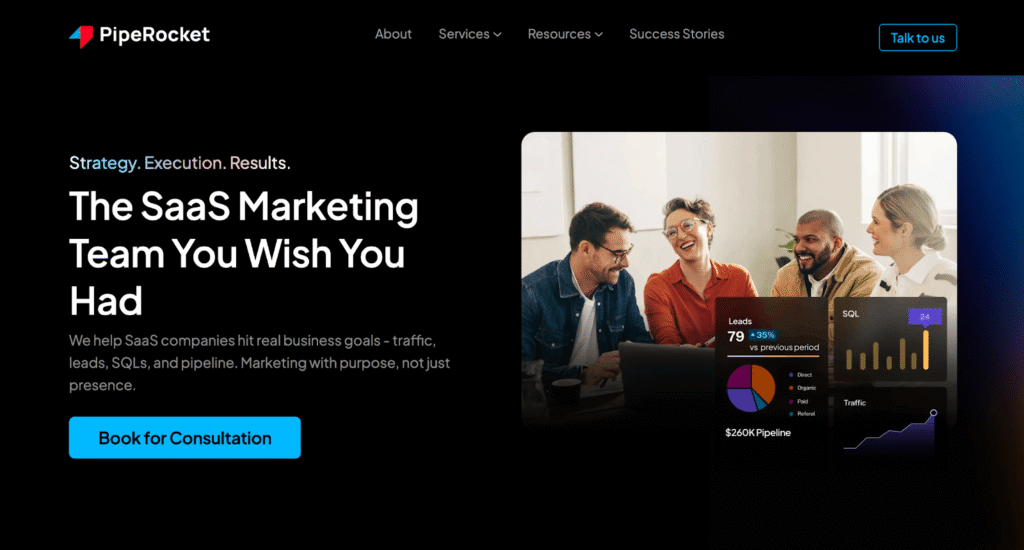
Industries covered: B2B SaaS, PtaaS, Fintech, and more
Expertise: SEO, technical SEO, keyword analysis, competitor research, and content marketing.
Notable Clients: DevRev, Metricstream, Leadsquared, Tredence, Sprinto, Storylane, HappyFox.
What sets PipeRocket Digital apart: PipeRocket’s agile framework prioritizes measurable results, making them effective for mid-sized businesses, start-ups and emerging enterprises. This results in accelerated lead generation and faster pipeline growth.
PipeRocket is one of fastest-growing digital agencies offering SaaS SEO services specialized for B2B and SaaS companies. They aim to deliver predictable revenue engines for your growth by focusing on technical SEO, content marketing, deep competitor analysis, and high-level strategy execution.
Team Size: 30+. Each of the clients are handled by a group of experts ensuring execution never stops.
Founders Experience: 25+ years
Pricing: Starts from $5000

Industries covered: Logistics, SaaS, fintech, construction and more.
Expertise: Content strategy, technical SEO, link building, product-led content, and transparent reporting.
Notable clients: Ahrefs, Chili Piper, Impactable and more.
Breaking B2B position themselves as an alternate to traditional B2B SaaS SEO agencies by offering revenue-driven SEO, competitor differentiators, delivering sales pipelines and much more. A results-focused SEO agency for SaaS and B2B, helping tech and service companies generate revenue and qualified leads.
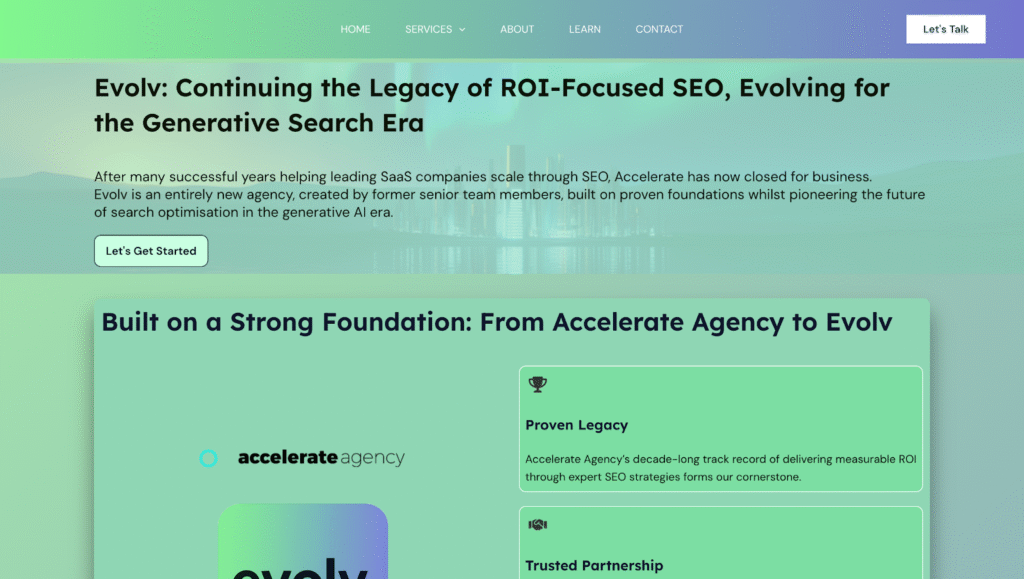 Industries covered: Communications, SaaS, fintech, workflow management, and more.
Industries covered: Communications, SaaS, fintech, workflow management, and more.
Expertise: AI-driven content strategy, keyword gap analysis, authoritative link building, and Onsite SEO.
Notable clients: RingCentral, Zendesk, Databricks, and more.
Accelerate Agency is a growth-focused SaaS SEO agency praised for their quick implementation of SaaS SEO strategies helping brands scale organic traffic, and drive revenue. Their expertise in high-authority backlink outreach, and transparent reports consistently deliver organic search results and pipeline ROI for their clients.
Summary of reviews: Accelerate Agency has increased organic traffic and lead flow through effective SEO strategies and site optimization. Clients highlight their collaborative approach, quick adaptability, and consistently helpful advice, with one long-term partner describing them as trusted strategic advisors rather than just service providers.
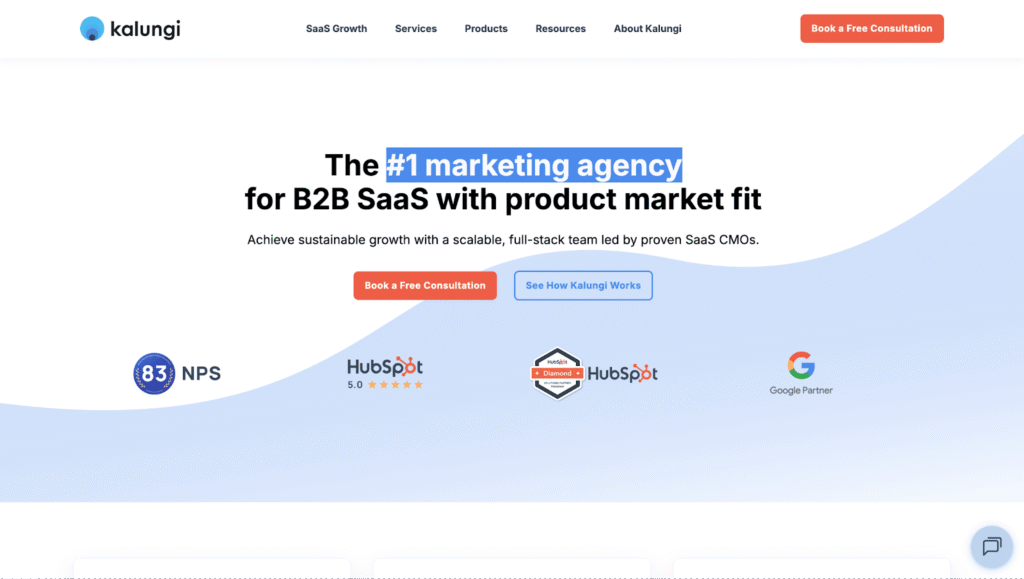
Industries covered: SaaS, Start-ups, fintech and more.
Expertise: ABM, content marketing, SEO, Branding, Web development and link building.
Notable clients: Patch, Beezy, iControl, and more.
Kalungi occupies a unique space in the B2B SaaS SEO agency market being a top SEO agency for SaaS guaranteed by Hubspot and partnered with Google. They offer complete go-to-market support, full-stack marketing teams, dedicated marketing leadership (CMO) and full coverage for marketing pipelines.
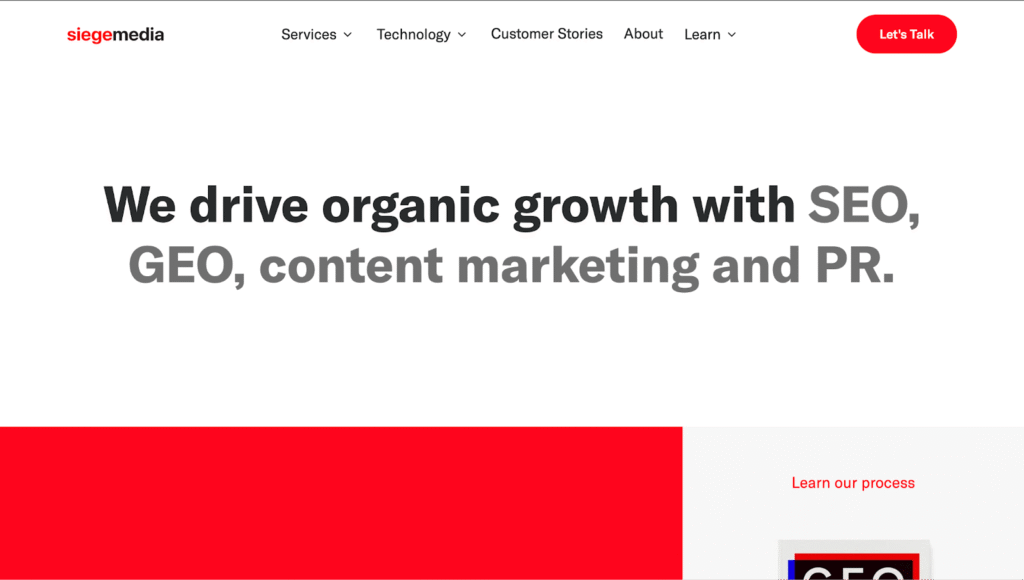
Industries covered: SaaS, B2B, fintech, Ecommerce, and more.
Expertise: Content strategy, product SEO, generative engines, content marketing, digital PR, content localization, web design, content creation, and graphic design.
Notable clients: Hubspot, AirBnB, Y Combinator, and more.
Siege Media is a SEO focused content marketing agency that delivers results through creative storytelling, strategic collaboration and data-backed content marketing. Also, known for their strong portfolio in SaaS SEO services, providing clients with marketing tools developed in-house.
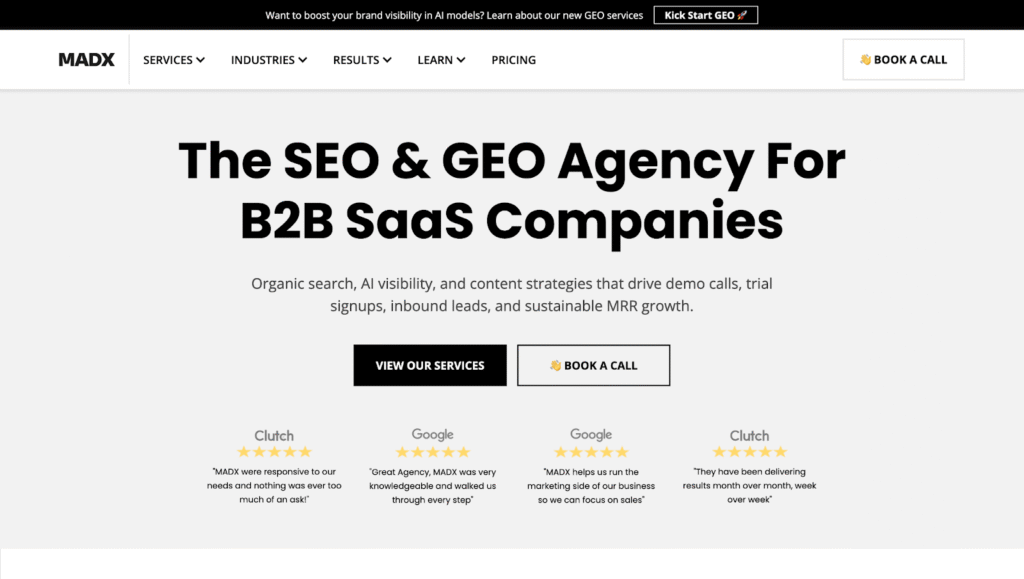
Industries covered: fintech, crypto, enterprise, SaaS, B2B and more
Expertise: SEO, content writing, digital PR, and link building.
Notable clients: MoonPay, UPSTIX, Maekersuite, and more.
MADX is a SaaS SEO and GEO agency offering hands-on discovery audits, growth planning, AI visibility, and performance monitoring. MADX Digital’s emphasis on artificial intelligence search and AI visibility alongside technical SEO and content marketing helps their clients capture emerging search trends, build educational content and drive MRR growth.
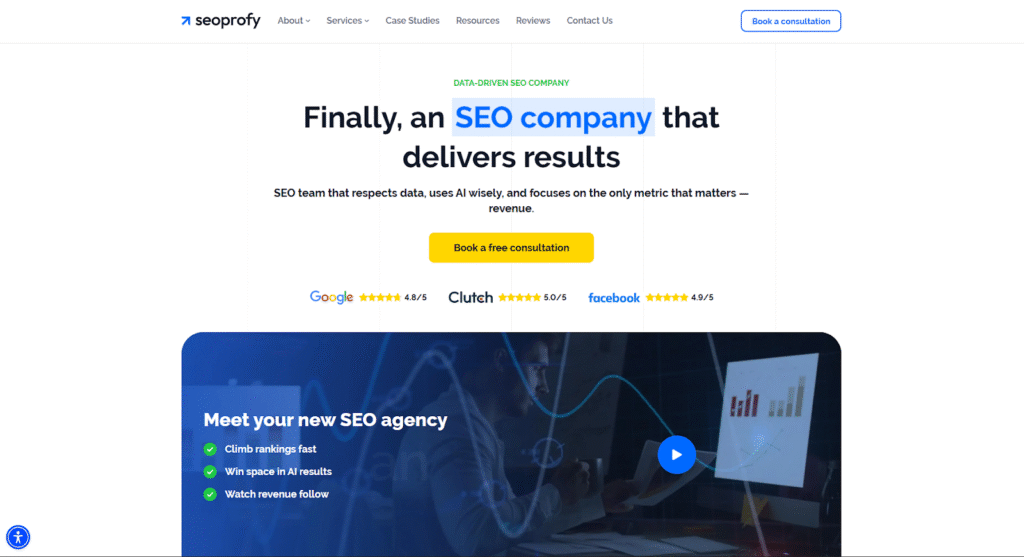
Industries covered: Law firms, Ecommerce, SaaS, B2B, Enterprises, healthcare, automotive, and real estate.
Expertise: SEO, link building, GEO, local SEO, site recovery, SEO audits, and content writing.
Notable clients: Jooble, Autodoc, FXTM, and more.
SeoProfy is a data-driven SEO agency with a global presence specializing in strategies that deliver traffic, increase demo requests and MRR, along with qualified sales pipeline for various industries. Along with various SEO SaaS services, SeoProfy also provides niche-specialized experts with real-world experience.
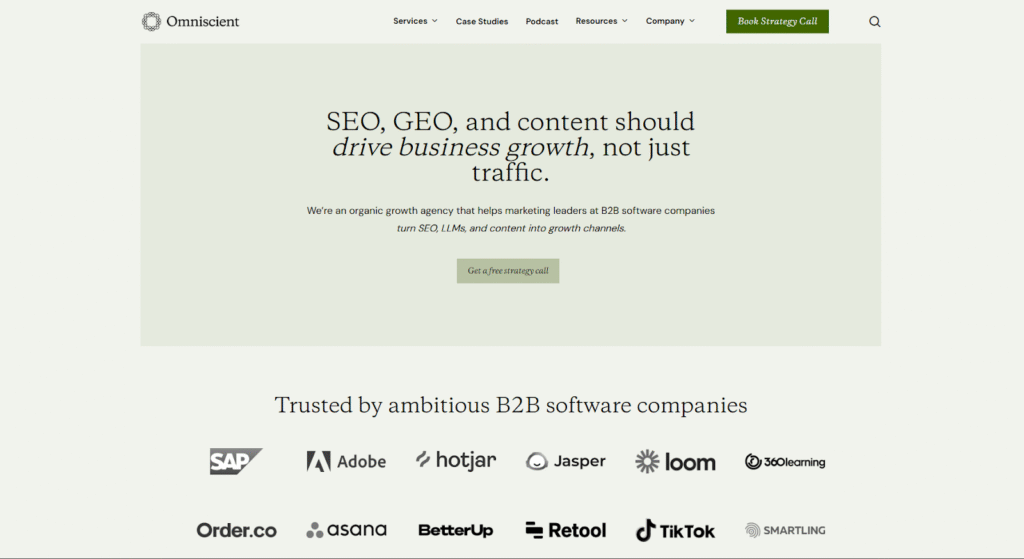
Industries covered: Enterprise software, SaaS, B2B, ECommerce, Fintech and more.
Expertise: SEO, content strategy, GEO, technical SEO, link building, content production, content optimization, and digital analytics.
Notable clients: SAP, Adobe, TikTok, and more.
Omniscient Digital is a SaaS SEO marketing company and an organic growth partner for leading B2B SaaS companies focusing on key business metrics, amplifying brand positioning and integrating SaaS seo services into broader business initiatives.
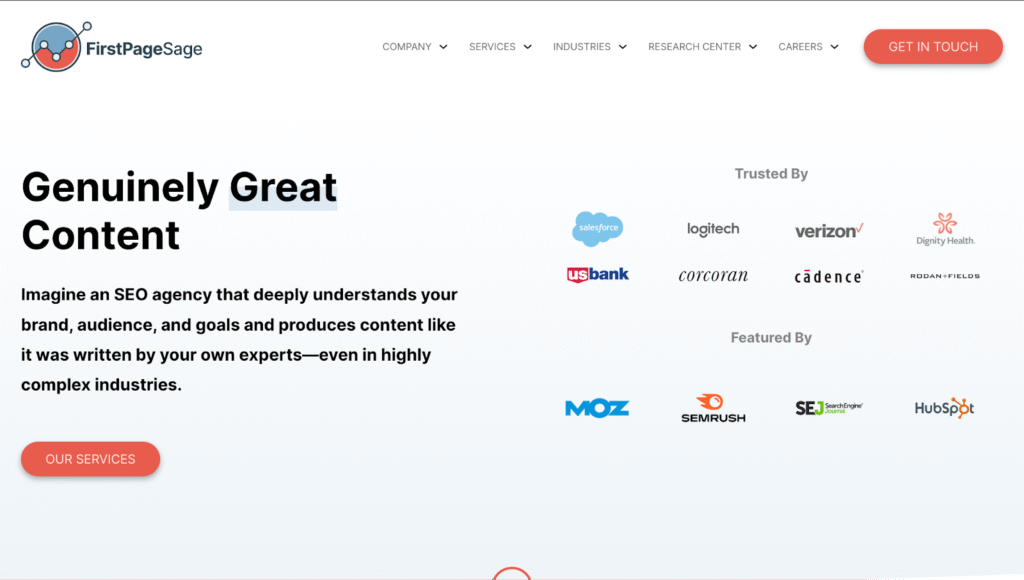
Industries covered: Fintech, Medtech, SaaS, B2B, Manufacturing, Real Estate and more.
Expertise: SEO, GEO, thought leadership, web design, and lead generation.
Notable clients: Salesforce, Logitech, Verizon and more.
First Page Sage is a strategy-driven agency well-established by its SaaS SEO services for building long-term organic marketing systems that showcases the brand’s vision. Their focus on thought leadership and research-backed white papers, forecasts and visual assets containing KPIs for decision-making.

Industries covered: Fintech, Marketplaces, SaaS, B2B, Education, and Aviation.
Expertise: SEO, keyword research, technical SEO, content marketing, link building, and GEO.
Notable clients: Gelato, Invoca, JotForm, and more.
Simple Tiger enables SaaS companies to grow at a quick pace using performance-driven marketing. To achieve fast results, Simple Tiger provides SaaS SEO services that are a combination of proprietary AI & data intelligence technology, proven actionable strategies, capitalizing competitive advantages and more.
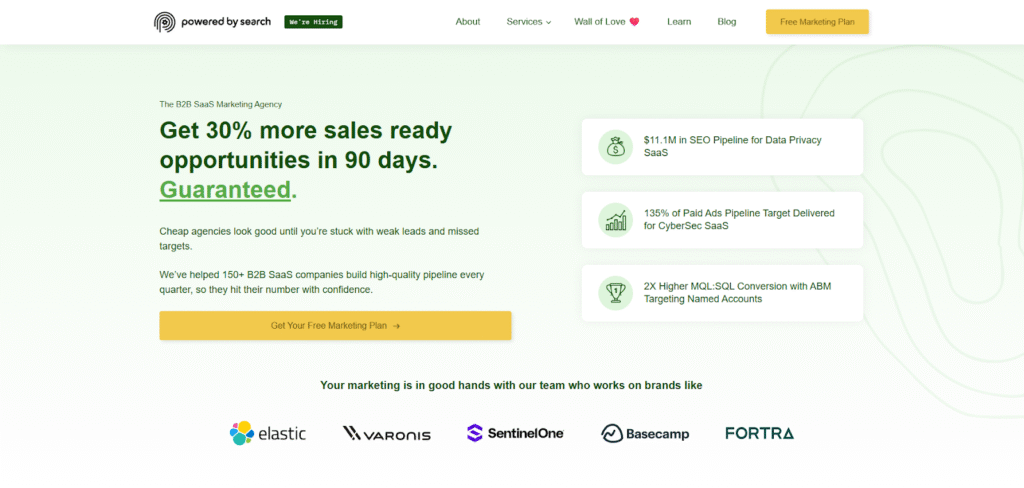
Industries covered: SaaS, enterprise, B2B, fintech, healthcare, IT & security and more.
Expertise: SEO, ABM, content marketing, digital PR, link building, and demand generation.
Notable clients: Basecamp, SentinelOne, Fortra, and more.
Powered by Search is a SEO agency for SaaS companies using SaaS SEO services that focus on building scalable strategies and demand generation systems resulting in a reliable pipeline generation. With neatly engineered content strategies, SEO, landing page optimization, this agency attracts decision-makers and converts prospects.
Choosing an SEO agency for your SaaS business should be based on various factors. Look for a strategic partner who understands the unique mechanics of recurring revenue models, user acquisition funnels, and the technical complexities associated with them. Here’s what to evaluate before signing the dotted line:
Don’t settle for general SEO experience; look for specific success stories in the SaaS industry. A strong seo agency for SaaS should be able to walk you through actual case studies: how they helped a productivity tool increase organic trial signups by 60% in six months, or how they built a bottom-of-funnel content engine that reduced paid ad spend by half.
Ask questions like:
A SaaS SEO agency worth hiring should know what drives your business: MRR, LTV, CAC, activation rate, retention, and churn.
For example, they should be able to map content strategy to key points in your user journey:
SaaS websites require in-depth understanding of SEO techniques to optimize crawl budget, site architecture, JavaScript rendering, and performance at scale for large, multifaceted websites.
Additionally, adding relevant Schema Markup for various types of pages, such as Organization schema on the homepage, Product schema on product pages, and FAQ schema on help sections, helps search engines understand and classify your content better.
All these techniques help in achieving strong search visibility while maintaining fast performance and boosting crawling efficiency by search engines.
A general SEO agency might overlook these technical roadblocks. But a SaaS SEO partner will ask:
The best SaaS SEO agency will develop a tiered SEO strategy that incorporates product-led pages, thought leadership content, industry-specific topics, and conversion-focused content. They’ll help you own high-intent keywords like “best CRM for small teams” or “[competitor] alternatives.”
They’ll also go beyond content and handle link-building with precision. They’ll get you links from:
SaaS companies move fast; you can’t afford to wait a month to see what’s happening. Your agency should provide:
SEO is ongoing, compounding work. As your company grows from pre-Series A to post-product-market fit, your needs will change. You could go from a single product to a multi-solution platform. Maybe your ICP shifts. Your SEO agency SaaS needs to be able to grow with you.
Look for signs they think long-term:
PipeRocket Digital is a top rated SEO agency for SaaS and B2B brands seeking fast, measurable SEO results that impact revenue, not just rankings. They enable accelerated lead generation and pipeline growth for start-ups, mid-sized businesses, and emerging enterprises and therefore increasing their business revenue.
The PipeRocket team stands out through deep SEO expertise, implementing comprehensive strategies, and transparent reporting that shows actual business outcomes.
As SaaS specialists, our team understands product-led growth and B2B buyer journeys. Each campaign is custom-built to align with growth objectives, in-depth competitor analysis, quality-driven content, and actionable insights.
Turn your SEO into a true growth engine with PipeRocket Digital – Book Your Consultation Call.
SaaS SEO is rapidly evolving in 2025. About 87.8% of businesses said they’re worried about their online findability in the AI era. To stay ahead and stop worrying about the uncertainties, you need a dedicated SaaS SEO agency that understands the in’s and out’s of SaaS SEO.
Top rated SaaS SEO agencies like PipeRocket Digital, Breaking B2B, Accelerate Agency, and more help your business stay updated on such algorithm changes, with data-driven optimizations and transparent reporting. This ensures long-term growth and competitiveness in the crowded SaaS market.
SaaS SEO is a specialized search optimization strategy tailored for Software-as-a-Service companies to drive organic visibility, qualified leads, and demos. It achieves desirable results using technical SEO, targeted content creation, product page optimization, and strategic link building to address the unique dynamics of SaaS sales cycles.
By building sustainable organic growth channels, SaaS SEO reduces customer acquisition costs, establishes market authority, and delivers long-term competitive advantage in competitive digital landscapes.
A SaaS SEO agency is equipped with the right strategies for driving organic growth for Software-as-a-Service companies through targeted search engine optimization.
SaaS SEO agencies understand subscription models, extended sales cycles, and multi-stakeholder buying decisions. They optimize product pages, build authority through content and link building, and align efforts with critical SaaS metrics like CAC and MRR, delivering sustainable organic pipeline and revenue growth.
SaaS SEO focuses on improving visibility for software products used by a broad audience. B2B SaaS SEO targets companies evaluating software for business needs, so the strategy leans heavily on long-form content, intent-driven keywords, and trust-building assets. The buying cycle is longer in B2B, which shifts SEO toward education, comparison, and bottom-funnel support.
SaaS companies require specialized SaaS SEO agencies due to subscription models involving complex, multi-stakeholder buying cycles lasting months. SaaS companies need education-focused content for various decision-makers, optimization for trial conversions rather than immediate purchases, and strategies aligned with MRR and CAC metrics.
SEO agencies for SaaS target high-intent specific keywords, create content throughout extended sales funnels, and build organic growth that compounds over time. This expertise transforms SEO into a revenue-driving engine matching SaaS economics, delivering ROI while reducing customer acquisition costs through qualified lead generation.
Most SaaS companies start seeing early movement in 3–4 months, but meaningful pipeline impact typically kicks in around months 5–6. That said, timelines can vary based on your site’s current health, content gaps, and the level of competition.
Yes. A well-built SEO strategy generates qualified, recurring traffic, which reduces customer acquisition costs (CAC) over time and alleviates pressure on paid spend. Many of our clients have scaled back on ads once organic became their top acquisition channel.
SEO supports PLG by driving intent-based traffic directly to your sign-up or ‘try it now’ pages. We also create use-case content and onboarding-supporting articles that encourage free users to take action and convert.
Get fresh ideas, actionable insights and expert guidance for B2B events delivered
directly to your inbox!
Please note that we only partner with 1-2 new clients per month
Book for Consultation